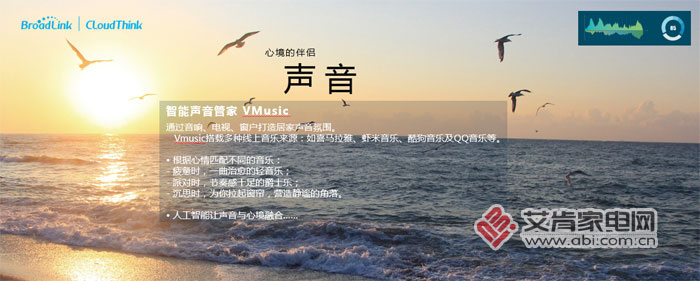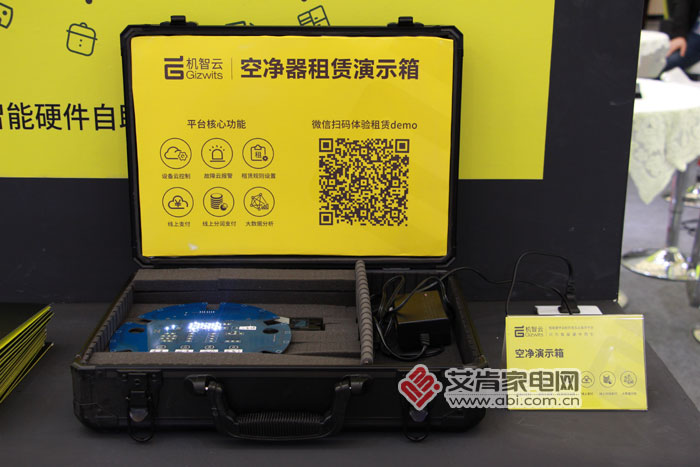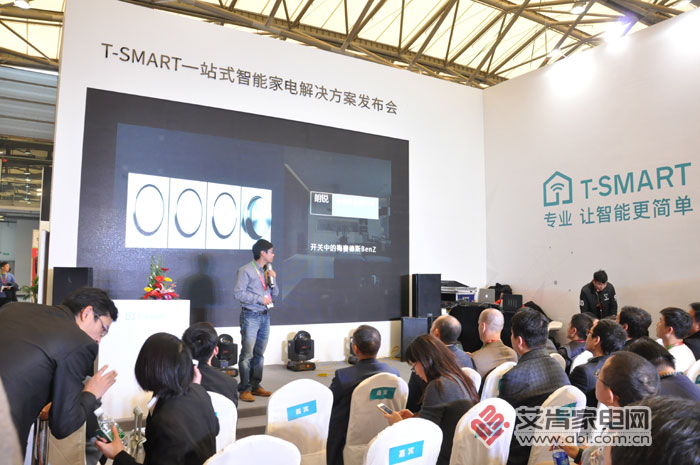OFweek smart home network news In recent years, "smart" has become a household electrical appliance companies can not avoid the topic. On the one hand, more and more companies are chasing smart waves, and intelligence has become one of the topics and important topics for major exhibitions. But at the same time, in the terminal market, the enthusiasm for consumption caused by intelligent products is far from expected.
After experiencing a period of low tide in 2016, the rapidly-adjusted smart home has once again returned to the focus of public opinion. From the current perspective, the smart home industry in China is developing steadily in a better and better direction. According to a report released recently by Markets and Markets, a market research and consulting company, the global smart home market will reach US$122 billion by 2022, with an average annual growth rate of 14% for 2016-2022. According to GfK Market Research's research on seven countries, more than half think that smart homes will have an impact on their lives in the coming years. The published national data shows that over 50% (51%) of users show an interest in smart homes, at the same level as mobile payments (54%), far exceeding other options such as wearable devices (33%). From an industry perspective, smart homes are showing a strong global presence. From
At the national level, the United States is leading the development of the industry. According to statistics of statista, in 2016, the US smart home market capacity was US$9.7125 billion, which is the country with the largest capacity in the global smart home market, with the second to fifth places being Japan, Germany, China, and the United Kingdom. In addition, from the perspective of the growth rate of smart home penetration, the United States ranked first with 5.8%, while traditional developed countries such as Japan, Sweden, Germany, and Norway separated from 2 to 5, and the penetration rate in China was only 0. 1%.
Interconnection is still the key to development
More and more home appliance manufacturers are involved in the smart home industry, and have launched their own smart home ecosystem. However, the current technical standards among various companies have not achieved interoperability and sharing. For example, wireless technology protocols that are known only to the public have WiFi, Bluetooth, and radio frequency, and they have various forms and advantages and disadvantages. The manufacturers have their own alliances, resulting in the production of smart home appliances that cannot be interconnected. Since various manufacturers already have a lot of investment and are not willing to sacrifice their own interests, it is difficult to reach a consensus on the same platform. The incompatibility of product influencing users' purchase choices also increases the laying cost of smart home systems. This is one of the “bottleneck†restricting the development of smart home industries.
At present, protocol standards organizations, chip component manufacturers, operating system vendors, and voice interaction vendors are working hard for interconnection. Many companies have also started cross-border integration. For example, Apple launched the HomeKit smart home platform for third-party companies; Google acquired smart indoor thermostat supplier Nest and Internet security camera maker Dropcam; Haier promoted its own U- Home system platform, to facilitate all kinds of home equipment interconnection; millet to create a smart home control center; Samsung's Smart Home and so on. Companies in different camps are deploying in the field of smart homes. It is foreseeable that in the future, the platform of each giant will be the core, gradually forming a more unified code of conduct or standard, gathering a series of advantageous resources, from a single product to the ecosystem, and intelligent As the process speeds up and upgrades, the smart home ecosystem will mature. The interoperability between manufacturers began to form a small group, small groups of Baotuan forward, this trend is worth pondering. We must know that in the past two years, the home furnishing manufacturers are still dominating themselves and developing their own interfaces and protocols to connect their equipment together, such as Haier's U+ and Xiaomi's Mi. As a channel provider for e-commerce, it also hopes to take its own lead and allow home appliance companies to use their own technologies, such as Jingdong.
Insiders pointed out that "openness" is a feature of the Internet age, and the development of smart homes also needs openness. Admittedly, compared with monopolies, this practice of “opening up†is obviously more suitable for the future development trend. Enterprises can also save themselves while increasing the sales volume of their products. In a word, the latest trend of smart home is cross-border integration.
Platform self-innovation series upstream and downstream
From the early days of the development of the smart home industry, smart home platform companies have existed in the upper and lower reaches of the tandem industry and strong cloud service capabilities, and have mushroomed in recent years. In the process of developing with the smart industry, platform-based companies have also undergone a process of self-innovation. Prior to this, most platform-based companies did not do a good job of "what should be done," the position of intelligence, intelligence, and downstream companies competing for hardware, etc., which are currently unreasonable. As an influential figure in China's smart home industry, BroadLink CEO Liu Zongxi sums up the previous intelligence: Most intelligent platforms and enterprises are self-possessed, what is intelligence, what kind of intelligence users need, and enterprises and platforms are all at all regardless of. Including BroadLink itself has also taken many detours. At this point, Liu Zongxi has also conducted a profound reflection.

However, after experiencing pains, the company began to sum up the past to renovate itself, no longer being smart and intelligent, and also having a new height in the direction of the company's development. Take BroadLink as an example. In 2017, we launched the “Max†virtual voice assistant, allowing users to control the appliances in the field through “Maxâ€, and how to use “Max†to solve the needs of scenes and customize the private scene mode. At the same time, BroadLink launched a full house smart new brand - "CloudThink Bolian cloud want" full house smart 2.0, for mid-to high-end users, in order to achieve full-house intelligence as the goal, with VT equipment sales, cloud intelligent services, etc. The ability to roll out the IoVT virtual world and lead the Internet of Things industry for intelligent industrial upgrading. In addition, “CloudThink Bolian Cloud Think†has a smart real estate solution that can actually land smart homes. The first one to achieve “CloudThink Bolian Cloud†was landing the most precious city mansion in China’s Shenzhen Maritime World Area, the Shuangban Shiguang Road, which was the most prestigious in 145 years. The Double Mile and Time Road created by BroadLink and China Merchants will redefine the future of the luxury property, which represents the highest level of products of the China Merchants Group. For example, based on science and technology and the future of intelligent design, aviation construction technology standards, the world's top luxury brands to build the top ten hardcover system, as well as South China Sea Shuangluo Club housekeeping services and so on.

The first brand of Internet of Things third-party cloud services ChiZiyun released artificial intelligence products, wit, Mary. Wit, Mary is a new generation of smart home service platform implemented under the framework of the Smart Home Ecosystems (SFE) concept supported by Sensor Fusion and Deep Learning technologies.
In an interview with Aiken Home Appliances, Wise Cloud’s general manager Huang Xixiong said: “Witty Mary is a platform service based on the basic knowledge of Wisdom Cloud. She can help home appliance companies train people to understand customer needs and provide equipment services. The smart housekeeper recommended, smart appliance companies accessing ChiZi cloud can be customized according to their own needs.Wisdom cloud access to many brands, multi-category equipment, we ecologically realize the real needs of the user smart home." In addition, Gizwits has also launched smart cloud appliance access system GDCS, smart cloud smart device management system GDMS, smart cloud Internet of Things time-sharing platform GALS, wit cloud smart recipe cloud “weiyun†and Gizmo cloud for smart home appliance companies. Five smart device management service systems, such as the micro-distribution management system GSMS, help home appliance companies rapidly realize corporate Internet + comprehensive strategic transformation. The five smart device management service systems of the Wisdom Cloud are based on the SaiS service based on the Wisdom Cloud IoT cloud service, which can be connected with mainstream ERP and CRM systems, and provide intelligent hardware based remote control, product management, after-sales service management, and user credit system. Inventory management, online device upgrades, automatic mode switching, digital production and testing tools, dealer management, WeChat distribution, and client-side quick access to smart services such as access to more services.
In addition to building a full-house smart platform company, BroadLink, and cloud-based big data development services, Wichita Cloud, Ayla provides smart products to China's smart home appliance companies.
As the world’s first enterprise-class IoT cloud platform, Ayla has provided an end-to-end PaaS service for “Device Cloud-Appâ€, and it has obvious advantages in the global market layout. As the industry's only globally deployed IoT cloud platform vendor, Ayla has established local cloud and local technical support teams in North America, Europe, and China, and seamlessly connects the Internet to global mainstream IoT platforms. With the Ayla IoT cloud platform, home appliance manufacturers can easily solve a series of challenges facing smart product exports, such as adaptability to laws and regulations in other countries, connecting with local clouds, insight into local markets, user experience habits, and local operations. Cloud services capabilities and costs, better time-to-market for new products, and more. Zhang Nanxiong, co-founder of Ayla and president of Greater China, told Aiken Home Appliances that “smart manufacturing†has become more than a certain company or a certain country, but has become a global “national sportâ€. As the only globally deployed IoT platform service provider in the industry at the present stage, Ayla is very pleased to establish strategic cooperation with Chinese home appliance companies. With the complementary advantages in resources such as technology and channels, it is possible to build a global wisdom together with Chinese home appliance companies. Life service system.

In August 2016, U.S. Smart Home Technology Co., Ltd., a subsidiary of the world’s top 500 companies, was officially signed with Ayla Networks Ayla Networks, the world’s leading enterprise-class IoT cloud platform (hereinafter referred to as “Aylaâ€). In the strategic cooperation framework agreement, the two sides will carry out strategic cooperation on products, technologies, global channels, and capital. Based on Ayla's global deployment of the IoT cloud platform, overseas channels, and other resource advantages, as well as the U.S. resource advantages in the areas of B2C appliances, smart homes, channels, etc., the two sides establish strategic partnerships, give full play to their respective resource advantages, and promote the development of globalization. The development of smart home products, systems and ecosystems and market channels lead the global smart life service.

It can be said that in the process of development, intelligent platform-based companies have gradually established their own development directions and gathered a large number of resource advantages. On the whole, the differentiation of platform-based companies has played a synergistic role in the development of the smart industry.
China will meet the development of intelligent market
According to a report released by the Industrial Development Research Institute of the Future Industry, the scale of the smart home market in China reached 60.57 billion yuan in 2016 (Note: Different organizations have different results in terms of their statistical calibers), and the year-on-year growth rate has also greatly increased to over 50%. It can be seen that the industry has a rapid development momentum. Since the beginning of 2011 in China, the smart home market has witnessed a marked rapid development stage. The trend of artificial intelligence technology convergence has spawned a large number of new technologies, new models, and new business models, creating a huge market demand. Domestic giants are rushing to launch new products and divide this huge emerging consumer market. The industry structure has also evolved significantly. Agreements and technical standards have a tendency of interconnection. New products are emerging one after another. With this round of exploration, the arrival of the market's outbreak may be only a matter of time. AVC expects that by 2020, smart TV penetration will reach 93%, and the penetration rate of smart washing machines, smart refrigerators, and smart air conditioners will increase to 45%, 38%, and 55%, respectively. It can be seen that the trend of home intelligence will be irreversible, and the potential market scale of China's smart home industry will be tempting and it is expected to become the next enthusiasm for the market.
Guangdong Ojun Technology Co., Ltd. , https://www.ojunconnector.com
